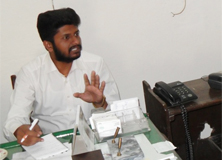
On 1 December 2010, Waqas Abid, JusticeMaker 2010, had a meeting with Ch. Abdul Rehman, the President of Kasur District Bar Association. Issues discussed included the gap in the enforcement capabilities of the criminal justice system and human rights violations in Kasur. The meeting took place to assess possible collaborations between the Bar Association’s aims and Waqas’ project, spreading the knowledge of legal rights to brick kiln workers throughout Kasur.
According to Mr. Rehman, the criminal justice situation in Kasur has significantly improved since the implementation of Pakistan’s National Judicial Policy, first implemented on 1 June 2009. The following is a quote from Chief Justice Iftikhar Muhammad Chaudry:
The key features of the National Judicial Policy is strengthening the independence of the judiciary by its separation from the executive and ridding the courts of the menace of corruption, thereby presenting a clean and positive image of judiciary. In the Policy, we have set high goals for ourselves. The goals are to initially reduce, and ultimately eliminate, backlog at the level of superior as well as subordinate courts, and further, to fix time frame for disposal of civil and criminal cases. The criminal cases will get priority on account of the sub-human conditions in which under-trial prisoners are kept in jails. Writs for protection of fundamental rights i.e. right to life, liberty, equality, property and freedom of thought, conscience, association, etc will also be maintained on fast track.
Prior to the Policy’s implementation, cases—which under Pakistani law should only take two weeks to investigate—usually remained under investigation for years, meaning those implicated were often in pre-trial detention for extremely prolonged periods. Due to the changes, courts have become significantly more effective, according to Mr. Rehman. The Law and Justice Commission is still in the process of fully implementing the new law, difficulties are arising through corrupt elements in the legal system. Mr. Rehman noted that torture is still widespread in the Pakistani legal system, in addition to other human rights violations, and an aggressive effort is required to tackle these problems.
The lack of affordable lawyers is the greatest hurdle to the creation of an effective legal system. This is the reason that Kasur District Jail is currently at 300% capacity, a difficult situation for the Jail Administration to handle given its limited budget. Thus Mr. Rehman welcome Waqas’ attempts to provide legal aid to the accused through his Good Thinkers organization. He stated more young lawyers are needed to partake in Waqas’ work, their enthusiasm as recent law school graduates could be a powerful force to impact the system. What is needed most, Mr. Rehman noted, is additional training to improve the courtroom skills.
Mr. Rehman asked Waqas for additional meetings to further develop the collaboration between his organisation and the Kasur bar.